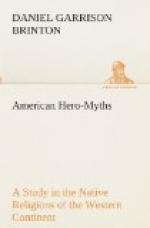Or I will further illustrate this development by a myth of the Huarochiri Indians, of the coast of Peru. They related that in the beginning of things there were five eggs on the mountain Condorcoto. In due course of time these eggs opened and from them came forth five falcons, who were none other than the Creator of all things, Pariacaca, and his brothers, the four winds. By their magic power they transformed themselves into men and went about the world performing miracles, and in time became the gods of that people.[1]
[Footnote 1: Doctor Francisco de Avila, Narrative of the Errors and False Gods of the Indians of Huarochiri (1608). This interesting document has been partly translated by Mr. C.B. Markham, and published in one of the volumes of the Hackluyt Society’s series.]
These striking similarities show with what singular uniformity the religious sense developes itself in localities the furthest asunder.
Returning to Michabo, the duplicate nature thus assigned him as the Light-God, and also the God of the Winds and the storms and rains they bring, led to the production of two cycles of myths which present him in these two different aspects. In the one he is, as the god of light, the power that conquers the darkness, who brings warmth and sunlight to the earth and knowledge to men. He was the patron of hunters, as these require the light to guide them on their way, and must always direct their course by the cardinal points.
The morning star, which at certain seasons heralds the dawn, was sacred to him, and its name in Ojibway is Wabanang, from Waban, the east. The rays of light are his servants and messengers. Seated at the extreme east, “at the place where the earth is cut off,” watching in his medicine lodge, or passing his time fishing in the endless ocean which on every side surrounds the land, Michabo sends forth these messengers, who, in the myth, are called Gijigouai, which means “those who make the day,” and they light the world. He is never identified with the sun, nor was he supposed to dwell in it, but he is distinctly the impersonation of light.[1]
[Footnote 1: See H.R. Schoolcraft, Indian Tribes, Vol. v, pp. 418, 419. Relations des Jesuites, 1634, p. 14, 1637, p. 46.]
In one form of the myth he is the grandson of the Moon, his father is the West Wind, and his mother, a maiden who has been fecundated miraculously by the passing breeze, dies at the moment of giving him birth. But he did not need the fostering care of a parent, for he was born mighty of limb and with all knowledge that it is possible to attain.[1] Immediately he attacked his father, and a long and desperate struggle took place. “It began on the mountains. The West was forced to give ground. His son drove him across rivers and over mountains and lakes, and at last, he came to the brink of the world. ‘Hold!’ cried he, ’my son, you know my power, and that it is impossible to kill me.’” The combat ceased, the West acknowledging the Supremacy of his mighty son.[2]




